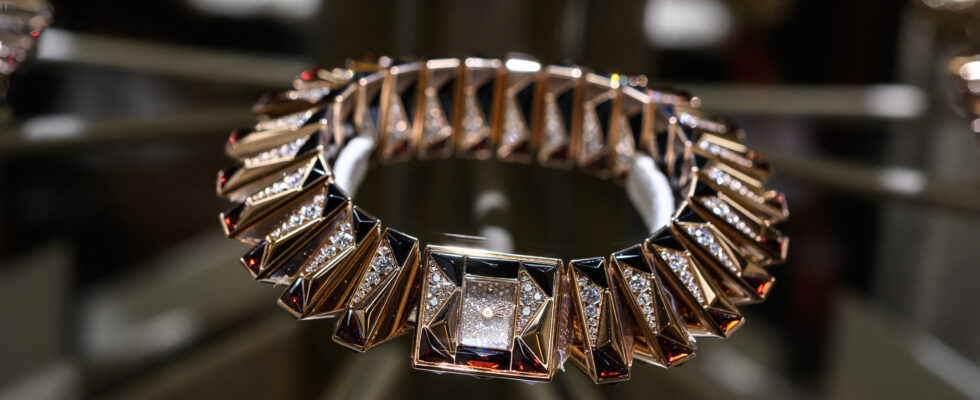(BFM Bourse) – The Swiss group saw its growth jump by 22% excluding currency effects in the last quarter of its 2022-2023 financial year, greatly exceeding analysts’ forecasts.
If French luxury stocks have shown all their brilliance – LVMH in particular – during this earnings season, the Swiss company Richemont is not to be outdone, far from it.
The company, which counts Van Cleef & Arpels, Cartier and Piaget among its brands, exploded expectations in the last quarter of its 2022-2023 financial year, which ended last March.
Over the period, the company generated revenues of 4.87 billion euros, up 22% at constant exchange rates when the consensus was expecting an increase of only 12%.
Its flagship division, jewelry, was the main driver of Richemont, with an increase of 27% on a like-for-like basis, to 3.36 billion euros, a marked acceleration compared to 8% in the previous quarter. And here again, the consensus was clearly exceeded, since the design offices were only counting on an increase of 13%.
>> Access our exclusive graphic analyses, and enter into the confidence of the Trading Portfolio
A “breathtaking” quarter
Like its French rivals, the group benefited from the strength of the recovery in China, with the Asia-Pacific region growing by 25% excluding currency effects. This geographical area represents nearly half of the group’s revenues. Note also the strength of growth in Japan, where sales jumped 36% excluding currency effects from January to March, a dynamic that was also observed at LVMH. To the point that the financial director of the French group, Jean-Jacques Guiony, had difficulty explaining these good figures to analysts, nevertheless evoking stronger confidence among Japanese consumers, with inflation much more measured in Japan than in many countries. developed.
Over the whole of the 2022-2023 financial year, Richemont saw its sales increase by 19% to 19.95 billion euros while its current operating income stood at 5 billion euros, up 34% and 5% higher than the consensus.
The operating margin stood at 25.2% against 22.4% over the previous year and 24.5% expected by analysts. The operating margin of jewelery alone is close to 35%.
On the Zurich Stock Exchange, the Richemont share took off thanks to these good results, taking 4% around 2:45 p.m., after having peaked at 7.7% at the start of the morning. This then allowed, for a time, French luxury groups to earn around 1% each on the Paris Stock Exchange.
“Despite major market concerns ahead of Friday’s release, fearing greater jewelry cyclicality, Richemont delivered a stunning fourth quarter (…) that addressed those fears,” UBS said. The Swiss bank appreciates the palpable outperformance of jewelry which, according to it, lends credence to the idea that this segment of the group is now catching up, after having lost market share for several years.
No engagement neither with LVMH nor with Kering
Stifel, for his part, evokes an end to the 2022-2023 financial year “on a very high note”. Royal Bank of Canada stresses, for its part, that the growth of the fourth quarter is at the level of the best students in the sector, that is to say Hermès and the fashion and leather goods division of LVMH.
Although Richemont is the most important European luxury value in terms of capitalization after the French groups, market rumors sometimes evoke a merger with Kering or a takeover by LVMH. The Swiss newspaper Finance and Wirtschaft (“Finance and economy”) had notably mentioned this last possibility, in February.
The chairman of the board of directors of Richemont, Johann Rupert, brushed aside these rumors on Friday, deeming them “erroneous”.
Concerning LVMH, the leader, quoted by Bloomberg, explained that he maintained a friendly dialogue with Bernard Arnault, the CEO of the world number one in luxury, but that he was not interested in a rapprochement of his group with the company. French, stating that Richemont was not for sale. “We mutually respect our independence,” he said.
As for Kering, Johann Rupert clarified that Richemont had been approached two years ago by investment bankers who had “pitched” a merger with the parent company of Gucci. “For information, we said no,” he said.
Julien Marion – ©2023 BFM Bourse
